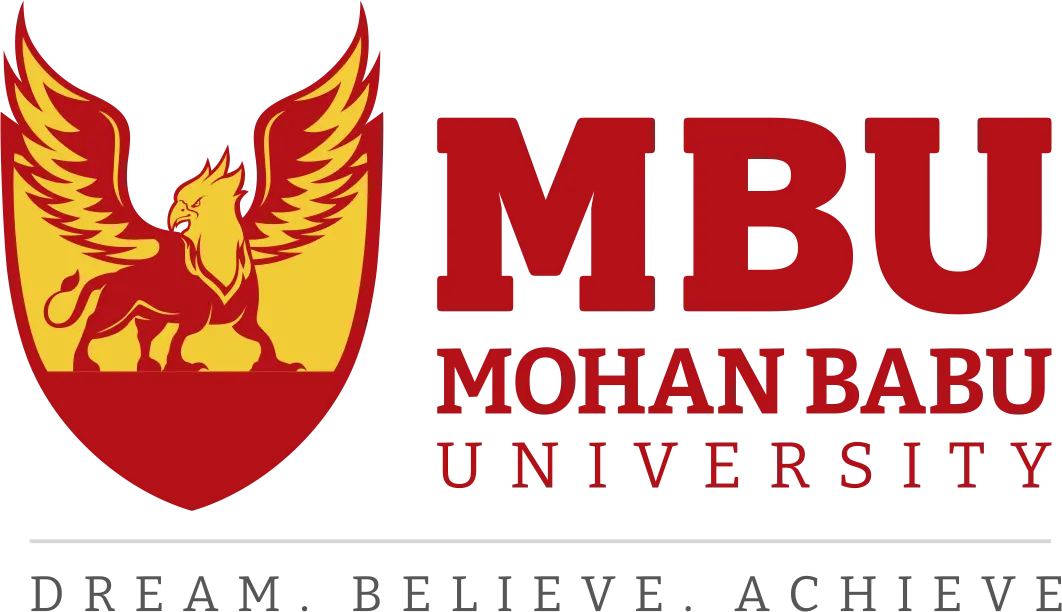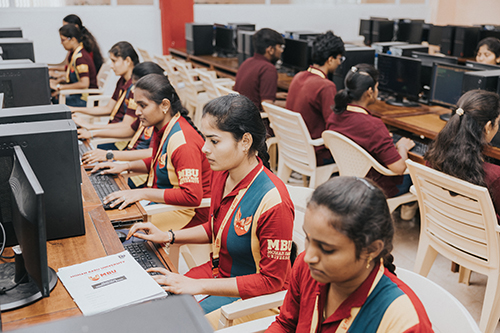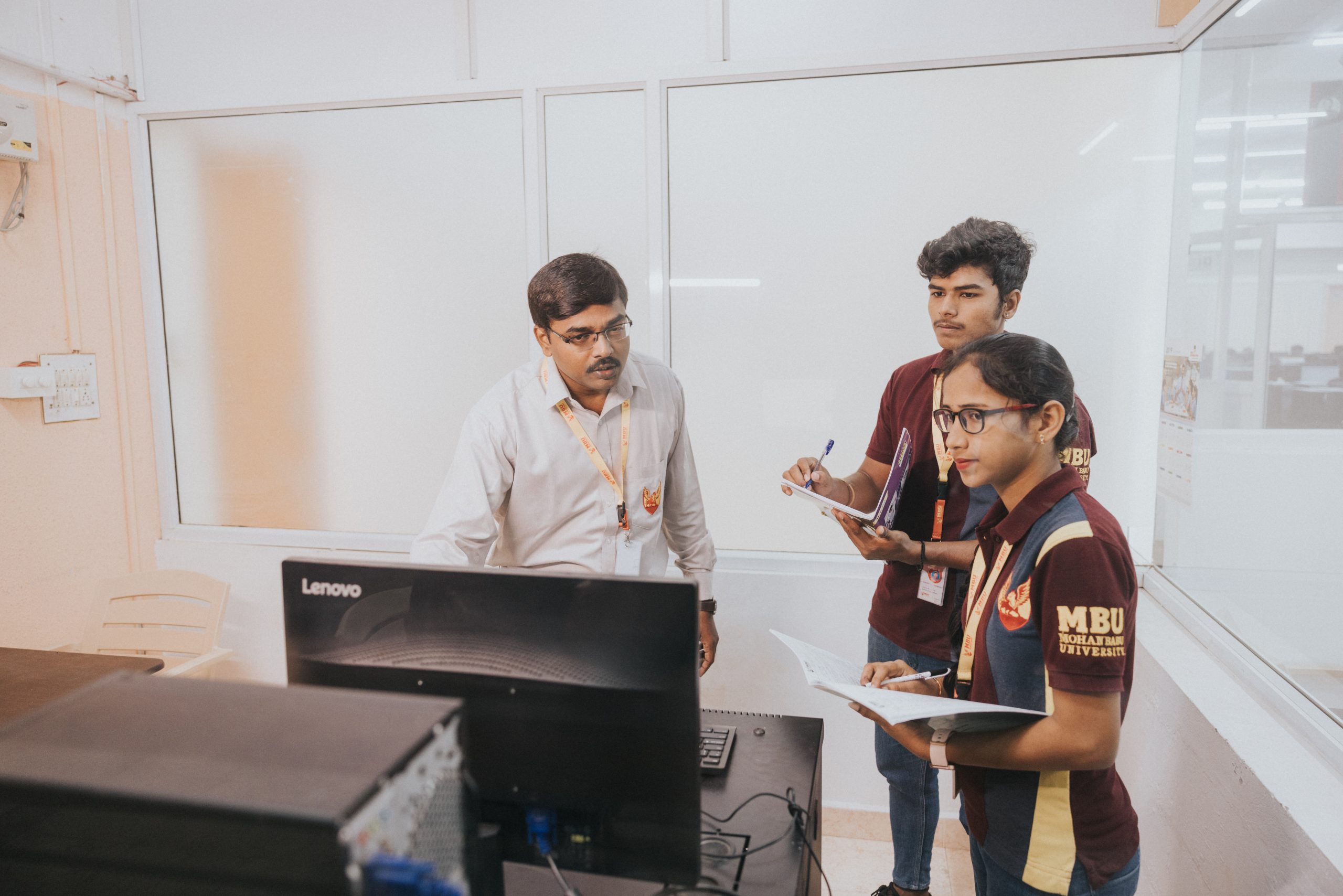Introduction
Electronics and Communication Engineering (ECE) is central to the rapid digital transformation shaping the modern world. From smart devices and artificial intelligence to telecommunications and automation, ECE drives innovation across virtually every sector. At Mohan Babu University (MBU), the B.Tech Electronics and Communication Engineering program serves as a powerful launchpad for aspiring engineers ready to shape this dynamic future. With a commitment to blending rigorous academics, cutting-edge research, and real-world application, MBU’s ECE program epitomizes excellence in preparing future technology leaders.
About ECE at MBU
MBU’s 4-year B.Tech in Electronics and Communication Engineering is meticulously crafted to provide a strong foundation in core and emerging areas of ECE. The comprehensive curriculum spans 160 credits, featuring key subjects such as Digital Signal Processing, Image Processing, Electronic Circuit Analysis and Design, VLSI (Very Large Scale Integration), Microcontrollers, and more. The program emphasizes hands-on learning, with capstone projects and industrial internships that give students practical insights and experience. Graduates from MBU are equipped to design and implement advanced electronics and communication systems vital to sectors including defense, space research, telecommunications, IT, railways, power, and hardware manufacturing. This course at MBU is a beacon for students who aspire to be at the forefront of the future of electronics engineering.
Specialized Tracks & Advanced Curriculum
MBU’s ECE program offers specialized tracks such as Embedded Systems & Internet of Things (IoT) and Artificial Intelligence & Machine Learning (AI & ML). These specializations allow students to focus on exciting, high-demand domains that combine hardware and software innovation. The curriculum utilizes a research-based pedagogy incorporating flipped classrooms, project-based learning, and mind-mapping techniques to enhance critical thinking and problem-solving skills. Ph.D.-qualified faculty members, many of whom are actively engaged in national and international research publications, mentor students through these advanced topics, ensuring a rich academic and research experience.
State-of-the-Art Labs & Infrastructure
MBU boasts an impressive array of laboratories that support the ECE curriculum and research pursuits. Key labs include Nano Electronics Lab, Communication Lab, Microwave Lab, Digital Signal Processing (DSP) Lab, IC Applications Lab, RF and Mixed-Signal Lab, Biomedical Instrumentation Lab, Industrial Automation Lab, Process Control Lab, Semiconductor Devices Lab, and specialized Simulation and Project Labs. These well-equipped labs provide hands-on training with cutting-edge equipment and simulation tools, facilitating deep understanding and innovation in electronic and communication systems.
Research & Innovation Ecosystem
Mohan Babu University strongly emphasizes research and innovation within its ECE department. Established research centers focus on areas including MEMS/NEMS (Micro/Nano Electro Mechanical Systems), Communication & Signal Processing, VLSI & Embedded Systems, with special attention to IoT and automation technologies. Faculty and students actively publish in reputed national and international forums, fostering a vibrant academic environment. The university’s support for research extends to funding opportunities, seed grants, patents, workshops, guest lectures, and industrial visits, cultivating a thriving ecosystem that nurtures creativity and technical breakthroughs.
Academic Leadership & Recognition
The Electronics and Communication Engineering department at MBU is recognized as a research center for Ph.D. studies under Jawaharlal Nehru Technological University Anantapur (JNTUA), with a strong legacy of academic excellence. The department’s faculty strength includes over 25 Ph.D.-qualified professors who guide and inspire students in both academics and cutting-edge research. Several faculty members have been acknowledged among the world’s top scientists, reflecting the department’s commitment to quality scholarship and leadership in ECE education.
Real-World Applications & Career Paths
Graduates from MBU’s B.Tech ECE program are well-prepared for diverse career sectors such as telecommunications, hardware design and manufacturing, defense and aerospace, information technology, railways, healthcare, automation, and industrial control systems, among others. The comprehensive curriculum, strong industry exposure, and rigorous project work equip students with the skills necessary for roles in design, development, system integration, and research. Top recruiters include multinational corporations like TCS, Infosys, Wipro, Qualcomm, Intel, and Samsung, positioning graduates for competitive and rewarding career trajectories.
Collaborations & Research Support
MBU fosters a flexible and holistic learning environment that integrates industry-oriented academic models with practical exposure through collaborations and partnerships. The university supports innovation through well-funded research projects, patent facilitation, seed grants, and incubation centers like the Entrepreneurship Development Cell (V-Hub). Students benefit from guest lectures by industry experts, immersive workshops, and industry visits that provide insights into current technological trends and business practices. This nurturing ecosystem helps students develop agility and readiness for the emerging technological landscape, including embedded systems IoT at MBU.
FAQs
- What specializations does MBU offer in its B.Tech ECE program?
MBU offers specializations in Embedded Systems & IoT and Artificial Intelligence & Machine Learning within the ECE program. - Which labs and research centers support ECE students at MBU? State-of-the-art labs such as Nano Electronics, Communication, Microwave, DSP, VLSI, RF, Biomedical Instrumentation, Industrial Automation, and several dedicated research centers support ECE students.
- What kind of research opportunities are available in the ECE department? Research opportunities include work in MEMS/NEMS, Communication & Signal Processing, VLSI & Embedded Systems, IoT, and Automation, supported by funding, patents, and active faculty mentorship.
- What career sectors can ECE graduates from MBU enter? Graduates can enter diverse sectors like telecommunications, hardware manufacturing, defense, IT, railways, healthcare, automation, and power industries.
- How does MBU’s pedagogical model prepare students for emerging technologies? The model integrates research-based learning, flipped classrooms, project-based approaches, and expert faculty guidance to develop skills in cutting-edge areas such as embedded systems and IoT.
Conclusion & Call-to-Action
Mohan Babu University’s B.Tech in Electronics and Communication Engineering is a stellar choice for aspiring engineers eager to make their mark on the digital future. With its comprehensive and specialized curriculum, expert faculty, cutting-edge labs, and vibrant research culture, MBU equips students to become innovators and leaders in the transformative world of electronics and communication. Prospective students passionate about shaping technology advancements are invited to explore this outstanding program and apply to embark on an exciting journey of discovery and professional success.
This detailed overview reflects Mohan Babu University’s commitment to nurturing future-ready engineers in the fast-evolving field of Electronics and Communication Engineering.







